
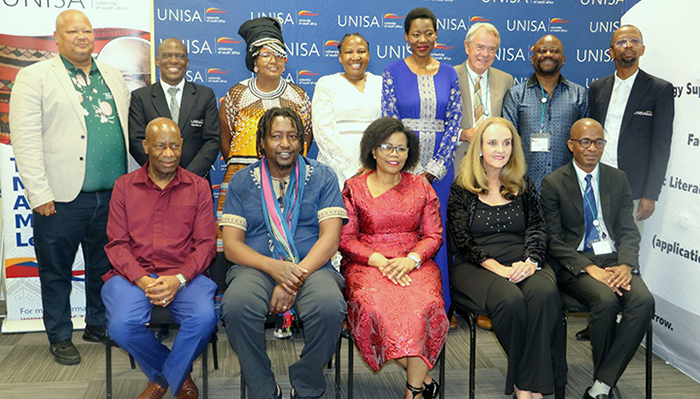
Speakers and members of Unisa’s executive management at the 16th Es’kia Mphahlele Annual Memorial Lecture
Themed "The African Writer as a Prophet and Social Critic in Contemporary Times", Unisa hosted the 16th Es’kia Mphahlele Annual Memorial Lecture in Polokwane on 26 November 2025.
The annual event honours the legacy of writer, educator, artist and activist Prof Es’kia Mphahlele to acknowledge his contributions to literary discourse, promote academic intellectualism and advance Unisa's social impact through teaching and learning, critical research and engaged scholarship.
Setting the tone for the lecture, programme director Dr Lerato Kobe of the university’s Department of Christian Spirituality, Church History and Missiology, said: "We are here to celebrate and memorialise a life that was well lived by a great voice making stories and challenging systems. Tonight, we are going to share ideas and examine a life that has inspired us."
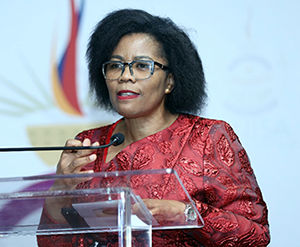
Prof Puleng LenkaBula, Unisa Principal and Vice-Chancellor
In her welcome address, Prof Puleng LenkaBula, the Principal and Vice-Chancellor (VC) of Unisa, said that it is often forgotten that Mphahlele was a global citizen. "It is essential for us as a university and as a country never to reduce his legacy only to the village that he came from," she said. "It is essential not to lock him just in his ethnicity nor in his village, because he actually lived around the world, making sure that the best of Africa's knowledge, its literature, and its critical analyses are respected globally. So let us allow him to flourish and to become the global icon that he should be."
Continuing, the VC stated that in the sixteen years that Unisa has hosted this annual lecture, the institution has ensured that the thoughts, work and life of Prof Es’kia Mphahlele remain alive for generations to come. "In celebrating, reviewing and critiquing the work of Es’kia Mphahlele," she continued, "we place a high premium on what it means to be an African university whose vision is to shape futures in the service of humanity. We equally do our best to ensure that Africa's intellectuals, their works and their ideas become an important arena of learning for our society and our universities, lest they are forgotten and the lessons they could have taught us are thrown in the dustbin of forgetfulness."
The VC stated that this year’s theme, "The African Writer as a Prophet and Social Critic in Contemporary Times", could not have come at a better time. "The recent G20 Summit, one of the increasingly important multilateral platforms in the world, had a timely theme of 'Solidarity, Equality, and Sustainability'," she said. "South Africa and the continent demonstrated its solidarity and spoke in unison about the need for an emancipatory programme for the continent. How do we ensure that the scholarship, the voices, the ideas, the technologies and the civilisations of this continent are respected, as we respect the civilisations of others? How do we ensure that we are also respectful of ourselves? We do this by honouring our knowledges, and the philosophies that remind us that I am because we are, and since we are, therefore I am."
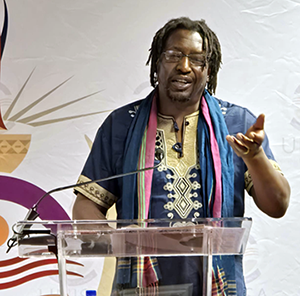
Prof Mũkoma wa Ngũgĩ delivered the 16th Es’kia Mphahlele Annual Memorial Lecture
Following an erudite introduction by Dr Lesiba Molepo, Acting Director of Unisa’s North-Eastern Region, and a heartfelt message of support by Dr Makoma Makhurupetje, Speaker of the Limpopo Legislature and Unisa alumna, the lecture was delivered by Mũkoma wa Ngũgĩ, a Professor of Literatures in English at Cornell University in the United States. He is an acclaimed scholar, novelist, poet and public intellectual whose work continues to shape contemporary African literary discourse, particularly in the areas of language, identity and decolonial imagination.
Ngũgĩ gave a fascinating account of his own history in an entertaining yet thoughtful manner, and his personal, intellectual and literary ties to Es’kia Mphahlele and South Africa.
Ngũgĩ said that, as in the case of Mphahlele, South African writers and intellectuals belong to their times, and as apartheid became entrenched, so did their resistance. "Early South African writers," he said, "were, as a movement, not only conscious of each other and immersed in their political and cultural context, but also aware of their influence on Black Americans and the Black diaspora."
Echoing the sentiments expressed by the VC earlier, Ngũgĩ said that Mphahlele should not be provincialised, and must indeed be viewed as a writer of the world. Continuing, he said that this then begs the question of why the writing of Mphahlele and his contemporaries, although well known in South Africa, is not known in the world. "Why doesn’t the African literary tradition acknowledge, critique and celebrate this early writing?" he asked. "As writers, our job really is to bury the generation that came before us. But why can’t literary criticism separate itself from the loss of memory of this writing? We have this knowledge that we still keep locked in African languages. The question of language, and how we view and where we start our African literary tradition, is central, and I don't think we'll ever run away from that question until we address it."
Concluding, he said: "What truth do we want from history, and can that history free us if indeed we are not conscious of most of it?"
Respondents to the lecture were Prof Puleng Segalo, incumbent of Unisa’s Chief Albert Luthuli Research Chair, Prof Everisto Benyera from the Department of Political Sciences, and Dr MaseTshaba Mantepu, Acting Executive Dean of the College of Economic and Management Sciences. This was followed by a thought-provoking question-and-answer session with lively audience participation, and the vote of thanks was delivered by Liana Joubert, Unisa’s Deputy Registrar of Student Admission and System Integration.
* By Philip van der Merwe, Editor, Department of Institutional Advancement
Publish date: 2025-11-27 00:00:00.0
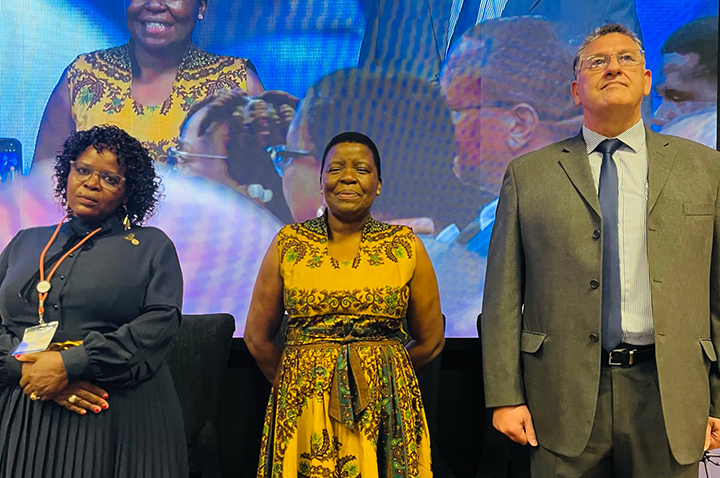 Imbizo targets fraud and corruption on a national scale
Imbizo targets fraud and corruption on a national scale
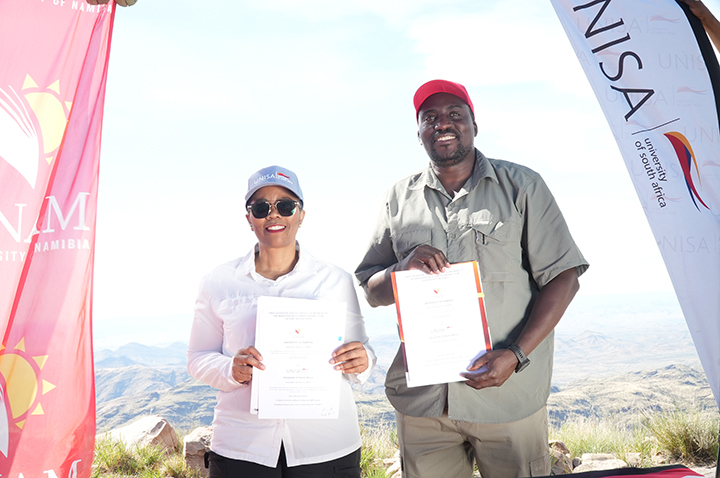 Unisa and UNAM partnership advances Africa Millimetre Telescope project
Unisa and UNAM partnership advances Africa Millimetre Telescope project
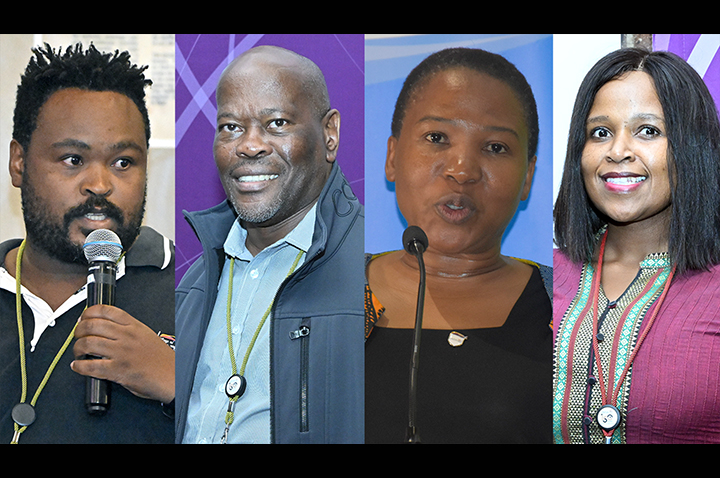 Unisans reflect on the 2026 Principal and Vice-Chancellor's Lekgotla
Unisans reflect on the 2026 Principal and Vice-Chancellor's Lekgotla
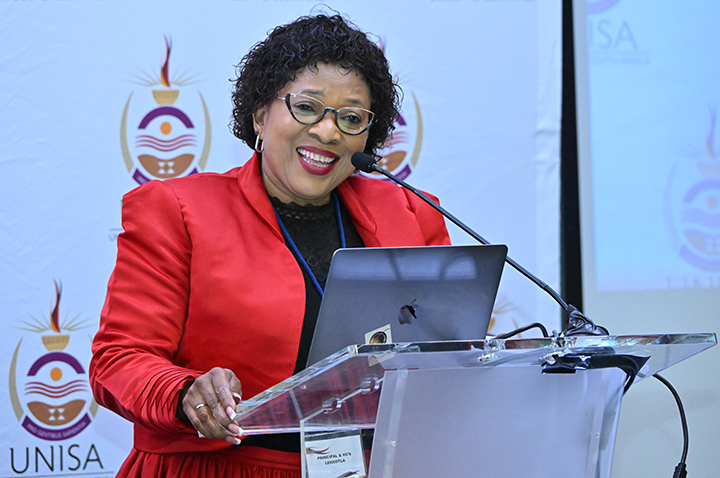 Lekgotla panel discussion rethinks the modern university
Lekgotla panel discussion rethinks the modern university
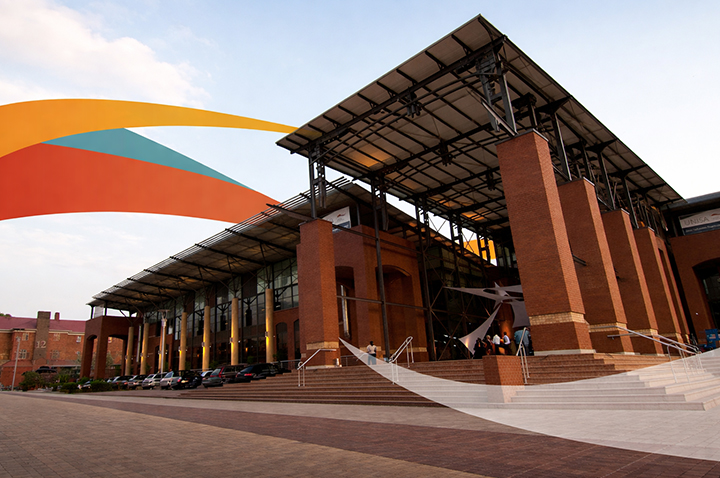 Unisa redefines student support through Inhlanyelo Hub NPC
Unisa redefines student support through Inhlanyelo Hub NPC